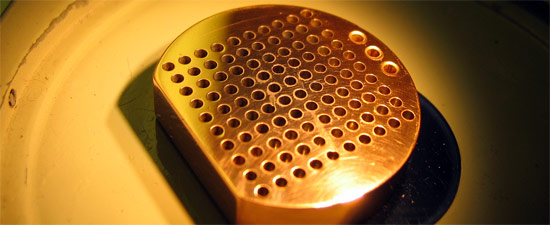
 |
| DEPARTMENT of GEOLOGY and GEOGRAPHY |

ANALYTICAL COSTS IN ANIMAL
The Auburn Noble Isotope Mass Analysis Laboratory (ANIMAL) is equipped for fully automated laser 40Ar/39Ar analysis of single crystals. The CO2-laser presently in use with ANIMAL enables analyses to be made via incremental heating and single-crystal fusion. Research work in ANIMAL is generally based on collaborations leading to publication of results, and typically involves the participation of laboratory personnel with students and research scientists. Students are particularly encouraged to visit and work in ANIMAL to assist in the analysis and data reduction for their samples.
Approximately three to six months of ‘turn-around time’ is generally required from receipt of prepared samples to the time of analysis and final data reduction (primarily to allow for the sample’s irradiation). Please contact laboratory personnel for questions regarding preparation of specific types of samples.
Samples will be evaluated for their suitability in 40Ar/39Ar dating by laboratory personnel soon after their receipt. The potassium and calcium content should be evaluated in all phases, particularly those that may have less than ~ 1-2% K2O and/or relatively high calcium (e.g., plagioclase, amphibole, and certain glasses). The sample petrography should be characterized.
We request that all lab users pay $500 per sample in order to help cover some of the direct costs incurred in the age determinations, including the standard irradiation. This fee applies to external and internal users, and is generally requested upon completion of analytical work. A typical ‘sample’ comprises many single-crystal laser fusion analyses, or many steps of laser incremental heating. In some cases, robust age determinations require a combination of incremental heating and single-crystal fusion techniques. The lab personnel will determine the optimum strategy for analyzing samples and the number of analyses for a given sample. Additional charges for analyses may apply in certain cases, as discussed below:
-
Studies that require more than 50 analyses per sample will be billed at a flat rate of $10/analysis. Thus, for example, a provenance study requiring 100 analyses of detrital minerals from one sandstone will cost $1000/sample.
-
Additional fees may apply if significant sample preparation (mineral separation from a rock sample, etc.) is required in ANIMAL. Such preparation will generally extend the turn-around time required for analysis.
-
Additional irradiation fees may be considered for cases that specifically require a turn-around time of three months or less. Such a fee would be discussed prior to accepting the sample(s) for analytical work.
-
Arrangements can be made to measure the composition of a phase of interest (particularly the potassium and calcium concentrations), or to have thin sections prepared, if such information is not otherwise available.
-
Cost quotations for proprietary analyses, that may include preparation of samples and other aspects of laboratory work and study, are available upon request.
Revised, 2/13/2012
ANIMAL